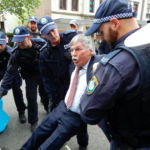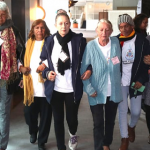The NSW Public Trustee Is Liberally Selling Off Managed Persons Assets, Says APTAGIE

“Imagine being under the control of a state-appointed guardian or public trustee and not being allowed to grab an ice coffee for a treat, buy presents for the grandkids or to replace your ill-fitting underwear?” posed Independent MP Andrew Wilkie in the federal lower house in March 2022.
“Sadly, this is the reality for many Australians” he continued, referring to 50,000 people nationwide living under the care of a public trustee or guardian that manages their financial interests. And Wilkie also referred to “other injustices”, with one of these often raised being the selling of assets.
In this state, the NSW Trustee and Guardian (NSWTG) is the public agency that governs the affairs of those deemed to be “managed persons”, which section 38 of the NSW Trustee and Guardian Act 2009 (NSW), defines as a protected person, “whose estate is subject to management”.
But as last month’s Audit Office of NSW report found NSWTG “does not have sufficient oversight to ensure that its services are consistent with legislative principles which aim to promote positive client outcomes”, and “there is a risk that some fee-paying clients are unknowingly subsidising others”.
Keeping it under wraps
The reason issues Wilkie and others have identified about public trusts aren’t readily circulating in the NSW public domain is that strict suppression laws forbid identifying managed persons, which are ostensibly for their protection, but also serve to conceal the clear problems within the system.
Section 65 of the Civil and Administrative Tribunal Act 2013 (NSW) prohibits publishing the name or any identifying material about a person involved in Guardianship Division proceedings, which covers all managed people, as this tribunal division decides whether they should be classified as such.
Currently, Tasmanian attorney general Elise Archer has her department inquiring into whether her state’s suppression laws around people under public trusteeship should be changed to allow them to speak publicly about their plight, which would open the way for further reforms of the state system.
Supported decision-making
Wilkie further raised the proposal of supported decision-making in parliament, suggesting that a national framework be established to be implemented in all states and territories.
As the NSW auditor general recently explained supported decision-making would substitute the state making decisions on behalf of managed persons, and instead, these people would be given assistance in exercising their autonomy and legal capacity to make their own decisions.
The NSW Law Reform Commission recommended this change take place in this state in a 2018 report, which is a position shared by Australian Public Trustee and Guardian Injustices Exposed (APTAGIE): an advocacy group representing managed or protected persons nationwide.
Sydney Criminal Lawyers spoke to an APTAGIE spokesperson about the public trustee system operating in NSW, the issues around the state taking over complete control of individuals’ assets, and that while such a system is needed, the current one necessitates desperate reform.
A protected or managed person is somebody who has been deemed by the state as no longer capable of managing their own affairs and, therefore, they’ve been placed in the care of the state. And each state and territory in Australia has its own guardianship system.
Australian Public Trustee and Guardian Injustices Exposed advocates on behalf of managed people and provides them with assistance in navigating the legal system.
So, in terms of managed people in NSW, who are we talking about and what sort of numbers exist?
Potential clients are those who suffer dementia, or traumatic brain injury, and, in rarer occasions, those with gambling and drug problems.
There are 12,556 people, under financial management in NSW, and 3,533 under guardianship.
The reason for the discrepancy may possibly be explained by the fact that clients under guardianship never pay fees to NSWTG, unlike trustee clients with assets.
Only trustee clients get forced to sell their house, which is where the worst profiteering happens.
So, as these guardian and trustee systems have been created to support these people, why is there a need for an organisation like yours?
NSWTG are effectively operating without oversight. The NSW attorney general claims to not have power over them, while the Ombudsman, in our experience, has never acted to correct that agency’s misconduct.
If there is going to be reform, like is underway in other states, it will have to come from people like us.
In the meantime, we offer emotional support and expertise to navigate the labyrinthine legal system to escape NSWTG’s clutches if such escape is warranted.
It isn’t warranted in maybe half the cases presented to us, but we always start off giving the person the benefit of the doubt and respect because they’re traumatised regardless.
The NSW Trustee and Guardian Act 2009 (NSW) established this state’s system in its current form.
Section 38 of the Act outlines that a managed person is an individual, “whose estate is subject to management”, which can be by “a suitable person” or NSWTG itself.
The management of people’s estates is a key feature of the guardian and trustee system that tends to lead to problematic or questionable outcomes. Why is that the case?
They routinely sell property despite officially claiming to only do so where necessary.
We fear that just like the outsourcing of work to PwC consultants on the part of the Australian Treasury has led to undesirable outcomes, so too does the outsourcing to Black Rock of the NSWTG “growth portfolio”.
This growth portfolio is the portion of client funds, which are invested rather than on-call.
Black Rock maximise their own profit on a house when it’s sold, while the interests of NSWTG clients is irrelevant to them and it’s not a huge stretch of the imagination to think the multinational investment company influences NSWTG decisions.
Except for when a client is still living in their home, we don’t know of a single example where NSWTG has not attempted to sell clients’ homes.
NSWTG claim to never sell a client’s home just to pay their fees, and yet, in a recent case we see this is exactly what they’re doing.
Black Rock lost their contract with the NSW Treasury for “sustained poor performance” in October 2021, but NSWTG apparently see no problem with them.
NSWTG sells up to nearly three times as many properties each year, than State Trustees Victoria does, yet State Trustees has only slightly fewer clients, 11,000-odd as comparted to NSWTG’s 12,556.
NSWTG, in fact, has described itself as the largest single client for selling properties in Australia, but its own clients have suffered horrendous losses as a consequence of those sales.
So, let’s do some arithmetic. What proportion of clients have their property sold?
NSW sees one in 19 clients’ properties sold. In Victoria, this is one in 44, while in Queensland, it’s one in 24.
And bear in mind not every client has property. According to the NSW Trustee and Guardian Annual Report 2021-22, NSW has 2,922 properties on its books from 12,556 clients under trusteeship.
That means only one in four clients have a property. And over that financial year, 477 properties were sold, so that means one in six properties were sold in that 12 month period.
In a recent interview, you raised problematic aspects around the way people are being assessed and deemed as a person who is in need of management.
So, how does one come to be a managed person in NSW? And what sort of issues surround this process?
It happens via an application to the NSW Civil and Administrative Tribunal (NCAT). The application can be by a concerned family member, but it can also be a social worker or even hospital staff.
It’s rare for one family member to be given management control over another because that would take much more effort on the tribunal’s part, than simply handing control over to NSWTG.
The problem with this arrangement is that NCAT is not bound by the rules of evidence that normal courts are.
A family member can have power of attorney suspended based on mere allegations by a vexatious sibling and actual evidence to the contrary can be ignored.
This makes handing power over to NSWTG effortless, with the NCAT hearing being mere theatre.
Last year’s Four Corners expose State Control revealed that once a person is designated as a managed or protected person, it’s very hard to get this determination reversed.
And it further revealed that trying to make minor decisions for themselves after an individual has been subjected to such as designation becomes difficult.
In this state, disputes around trusteeship and guardianship matters are settled in the NCAT. So, how do managed persons fare under this system?
Once a person is managed by NSWTG, removing them or challenging a decision by them in NCAT is fraught with technical difficulties.
It’s common for a client to be locked up in a nursing home or mental institution and the family be forbidden to visit – if they even know the location – because they’re told the client doesn’t want to see them.
While this, of course, can sometimes be genuine care for the client, the family should not be expected to accept this on hearsay.
Those managed people who regain mental capacity, in that they were originally misdiagnosed or have since recovered from stroke, find the system is loath to let them go.
There are three NCAT branches associated with public trustee matters, which are the Guardianship Division (GD), the Administrative and Equal Opportunities Division (AEOD) and the Appeal Panel.
Only AEOD grants you the right to legal representation, while permission needs to be granted in the GD.
NCAT makes a big deal about being a low-cost alternative to real courts, which is in fact a major reason why they were established.
Hence, NCAT discourages legal representation, which then gives NSWTG an edge in such hearings because they’re very familiar with the law and can trap you.
And bearing in mind the aforementioned contempt for evidence – marketed by NCAT as essential for a relaxed user-friendly experience – if one loses their hearing against the tribunal, they’re only subsequently entitled to appeal on an error of law, not on an error of fact.
Most laypeople will get this wrong in their application and lose their hearing as a result. And they will not be advised to amend their application before the hearing.
Also, most laypeople would mistakenly think that they need not exhaustively present evidence, such as receipts, statutory declarations and transcripts, because, after all, there’s no end to how in-depth one can go.
Laypeople would consider further evidence will be rejected if available in the first instance, and that it be put off for an appeal if necessary.
A lawyer would know this isn’t the way to proceed, because it applies in real courts too, but it’s counterintuitive to the layperson.
After a hearing, it’s almost essential to request the reasons for the decision in order to successfully appeal, however most laypeople don’t even know such a document exists. And by the time that understanding comes to them, it’s often too late to request one.
If you appeal a GD decision to the NCAT Appeal Panel, you have disqualified yourself from subsequently appealing to the NSW Supreme Court.
NCAT does not warn you about this despite their marketing themselves as user-friendly.
If you appeal an AEOD decision to the NCAT Appeal Panel and lose, you still have the option to appeal to the Supreme Court, however, as stated earlier, only on an error of law not an error of facts.
Essentially the system can thus be abused by NSWTG or biased NCAT members who can misrepresent the facts and the evidence without repercussions.
In certain cases, there are restrictions around the publication of the names of those who are in state care in NSW.
How do these laws work?
For even indirectly identifying a NSWTG client, the penalty is 12 months prison. If your family member is a NSWTG client you cannot say so in public, for example on social media or in news publications.
The rule our members stick to is that if you are yourself identifiable and able to be connected to an NSWTG client you are taking a big risk in mentioning this.
This includes, revealing your surname which happens to be the same as the client’s, or showing your face or your voice is heard on radio.
We’ve gotten away thus far by referring to a “loved one”. Some people under guardianship are identifying themselves but have not been caught out yet.
Further these laws exist ostensibly to protect those people who can’t be named, but how would you say they impact in a negative manner?
The only effective accountability of NSWTG is via media, but a faceless anonymous victim will not have the same emotional impact with readers or viewers, and it even undermines the credibility of the story in the minds of some.
Where NSWTG is the financial manager, a client isn’t able to be financially exploited by bad actors – if NSWTG is doing its job – so why keep their identity secret?
Sure, their dignity should be respected with regard to privacy, however the gag laws do not allow for such nuance.
One could argue that the “spirit” of the gag law should be taken into account – the intent of the law – but we do not know of any such nuanced case to have been brought before the courts for us to rely upon for precedent.
And lastly, APTAGIE understands that there needs to be a guardian and trustee system, but one that’s been greatly reformed.
And whilst this is a sensitive topic in the public domain, some politicians have been speaking out on the need to reform the various systems operating in Australia of late, notably this includes Independent MP Andrew Wilkie and the Tasmanian Greens.
Your organisation’s long-term goal is to see the system/s reformed. What sort of changes are needed? And how do you foresee them coming about?
In terms of legislation, it is up to us now, as we have a rare opportunity in NSW parliament, with the Greens and Independents holding balance of power.
Both the major parties benefit too much from having this system in place.
Tasmania is already moving forward with legislation to relax the gag laws, serving as a model for other states.
NSWTG should not be self-funded, at all, whereby trustee clients with assets are subsidising those without and all guardianship clients. It should be an entirely publicly-funded system, like Medicare is, and employees should all be public servants.
A move away from substituted to supported decision-making needs to be implemented, as recommended by the Australian Law Reform Commission in 2014, and the NSW Law Reform Commission in 2018, as well as the NSW auditor general has again raised last month.
And we want NCAT to respect the past patterns of behaviour of their clients in the way that the Supreme Court does, especially in honouring family involvement in decisions if that was the past pattern.
Currently, Queensland, Tasmania and Western Australia are setting up supposedly independent oversight boards, however there is no guarantee of independence and so it ends up a waste of taxpayer money.
The attorney general already technically has power but has claimed otherwise in emails. The Ombudsman has never helped at all.
We don’t need quasi-oversight. We want transparency.
We would like to see NSWTG be given explicit permission to comment on individual anonymised cases – without identifying the individual – so that they cannot sow doubt in media when allegations of wrongdoing arise.
There needs to be repercussions for NSWTG not responding to emails in a timely manner, as, despite granting themselves a ridiculously generous four weeks, they cannot even stick to that.
And further on transparency, we would like NSWTG to give permission for all phone calls with them to be recorded.
NSWTG should publish their charters, so that we can monitor their performance. Audio extracts from NCAT hearings should be allowed for public release, as long as they do not identify individuals.
Currently, we need to ask permission for this release to occur, and that’s unlikely to be given, while no justification for that decision needs to be provided.
And clients need to have access to their bank account and share portfolio details, where their money is held, as, currently, only an in-house word-processed compilation is provided with no opportunity for verification.
NCAT legislation needs to be reformed, so that their members have to abide by rules of evidence. That way precluding appeal on errors of fact would not be an issue, as it isn’t an issue in real courts, while misrepresentations of evidence would then be an error of law, which is sufficient to qualify for an appeal.
We have never been awarded legal costs against NSWTG in NCAT when fighting for a loved one who is their client. On the contrary, when NSWTG use a lawyer to represent their client, they charge the client.
NSWTG currently have nothing to lose by being vexatious, in fact, they often profit from it, and this clearly undermines confidence in our justice system.
NCAT often reject challenges to NSWTG by citing a statement from a judge thirty years ago about the precursor to it as having an “impeccable reputation”. Sometimes this is even provided as their main justification.
This example and the fact that NSWTG occupy a room in the Sydney NCAT building indicate that NCAT impartiality is questionable.







